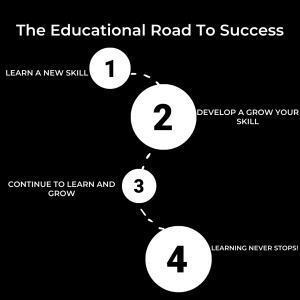How to Create a Career Development Plan That Works
Career development is an ongoing process that involves setting career goals and creating a plan to achieve them. Whether you’re looking to advance in your current field, switch careers, or simply explore new opportunities, having a well-designed career development plan can help you reach your goals and achieve long-term success.
Here are some steps to help you create a career development plan that works:
Assess your skills, values, and interests
Before creating a career development plan, it’s important to assess your current skills and interests. This will help you determine the career path that’s right for you, and what areas you may need to focus on for growth and development.
Consider taking a personality test or skills assessment to gain a better understanding of your strengths and weaknesses. This information can be used to guide your career development plan and help you make informed decisions about your future.
Set achievable career goals
When creating a career development plan, it’s important to set realistic and achievable goals. This will help you stay motivated and focused, and give you something to work towards. Your goals should be specific, measurable, and time-bound, and should align with your overall career aspirations. It’s also important to regularly review and adjust your goals as needed, and to celebrate your successes along the way.
Research your options
Researching different careers that align with your interests, values, and skills is essential for creating a career development plan that works. Learn about the job responsibilities, salary ranges, educational requirements, and potential growth opportunities. Identifying potential employers and researching the company culture, work-life balance, and benefits can help you make informed decisions about your career path.
Develop a plan of action
Creating a plan of action that outlines the steps you need to take to reach your career goals is critical. This plan should include a timeline for each step, as well as specific actions you need to take. For example, if you want to advance in your current field, your plan may include taking courses to acquire new skills, networking with industry professionals, and pursuing additional certifications. Now, if you’re aiming for a career in caregiving, your plan might include obtaining a Caregiver Ceritfication in PA (or elsewhere as per the job requirement), which can open up more opportunities and demonstrate your qualifications. Similarly, if you’re interested in project management, earning a PMP certification can enhance your skills and increase your job prospects. So, ensure that you have a clear-cut plan in mind before putting it in action. This will also help you figure out the time that will be required to complete each individual step along the way, thereby helping you realize the pros and cons of your plan.
Build a professional network
Build a professional network: Building a professional network is essential for career development. Connecting with industry professionals through LinkedIn, attending industry events, and joining professional organizations can help you build strong relationships with others in your field. This can help you stay up-to-date on industry trends and provide valuable opportunities for career advancement. Having a professional network can also provide valuable support and guidance as you navigate your career transitions.
Seek Support
Having a support system during a career transition can make a huge difference in your success and overall experience. When seeking support, consider reaching out to family members and friends who have experience in the industry you’re interested in or have gone through a similar transition themselves. They can provide valuable insight and encouragement as you navigate the ups and downs of the process.
In addition to seeking support from personal networks, consider joining a mentorship program or working with a career coach. Mentors can offer guidance and advice based on their own experiences, while career coaches can provide a more structured approach to helping you reach your goals. They can help you identify your strengths and weaknesses, set realistic and achievable goals, and develop a plan of action to reach those goals.
Take Action
Taking action is the next step in creating a successful career development plan. After setting your goals, it’s important to start working towards them and taking advantage of opportunities that arise. You should be patient and stay positive, but also flexible enough to make changes to your plan if needed. Consistent and persistent action towards your goals is key to success.
Regularly Evaluate and Adjust Your Plan
Regularly evaluating your career development plan is necessary for success. You should regularly review your progress and reflect on what’s working and what’s not. Based on this evaluation, you can make necessary adjustments to your plan.
Celebrating your successes and learning from setbacks can help you stay motivated and focused on your goals. It’s important to remember that career development is a continuous process and your plan should reflect this by being adjustable and flexible.
Creating a career development plan is an important step in achieving long-term success. By taking the time to assess your skills, values, and interests, setting achievable career goals, researching your options, and taking action, you can ensure that you are on track to reach your career aspirations. Stay focused, stay positive, and don’t be afraid to seek support along the way.


